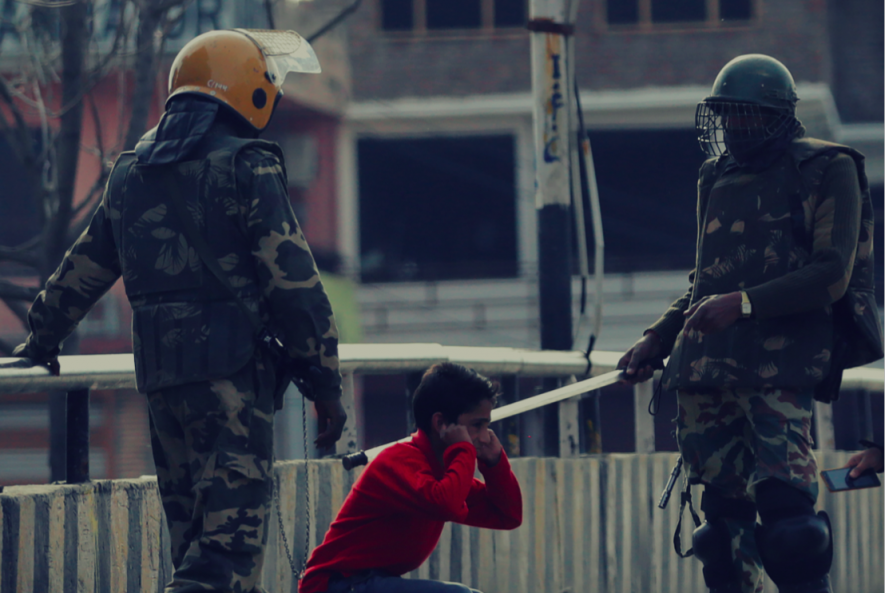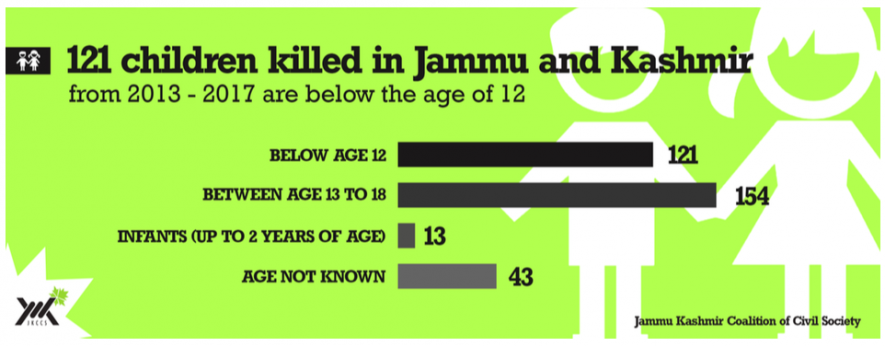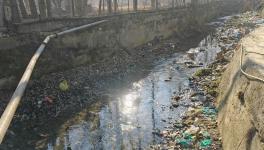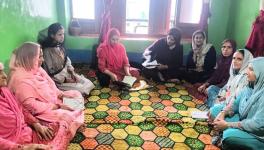Devoid of Basic Rights and Safety, J&K Children Continue to Suffer

Image Courtesy: Abid Bhat/JKCCS
Just three months into the year, five minors have lost their lives in different incidents of state violence in Jammu and Kashmir, including the gruesome case of rape and murder of the eight years old girl in Kathua, Jammu. To draw attention to the violence perpetrated against children in almost three decades of conflict in Kashmir, JKCCS (Jammu Kashmir Coalition for Civil Society) has come up with a report documenting the various ways in which fundamental rights of children are being violated on a regular basis in the state. It also shows how children have become a tool at the hands of the state for instilling fear in civilians, who may wish to express dissent.
The report points out that due to the heavy militarisation of the state, children in J&K are exposed to all six grave violations that have been underlined in the 1989 UN Convention on the Rights of the Child: killing and maiming, recruitment and use of children, sexual violence, abduction, attacks on schools and hospitals, and denial of humanitarian access.
The report focusses primarily on cases in the last fifteen years. Three hundred and eighteen killings of children have been recorded during this period. These constitute almost 7 per cent of all civilian killings in this period in the state.
Causes of the killings
The causes of violence that’s inflicted upon the civilians in J&K are more or less same for the children as well. Deaths of children have been recorded during encounters, custodial killings, enforced disappearances, militant clashes, explosions, and cross-firing between the state forces and militants.
Children have not been able to escape the torture at the hands of the armed forces. In the last fifteen years, seven children lost their lives to the physical torture. Most civilians, including minors, who are detained by armed forces, undergo severe physical torture in the custody. However, the stories of torture fail to draw attention, unless they result in deaths.
The report also says that four children were beaten to death by armed forces during this period, showing that child deaths cannot be just called indirect or collateral damage, when children are direct targets of violence.
Apart from the targeted attacks, many children lose their lives in explosions from grenade blasts, IEDs, landmines, etc. Nine children have died while they were fiddling with littered shells. This reflects the extent of sheer irresponsibility of the armed forces deployed in the state.
Age of the child victims
Almost half of the children who lost their lives during the span of last 15 years, were below the age of 12 years. Thirteen of them were infants – two years old or younger. “The youngest victim of violence in Jammu and Kashmir in last fifteen years was the 10 months old baby Irfan, who was killed in 2010, when his mother was caught between government forces and protestors in Dangiwacha, Baramulla,” the report says.

Sexual violence
The issue of sexual violence is a difficult one to document in J&K. The stigma attached to such incidents makes it difficult for victims to speak out. It becomes compounded, as the judicial processes favour the perpetrators, that is, in many cases, the armed forces.
In the cases that have been reported, there has been no action against the accused from the armed forces. One of the biggest and most heinous case is that of the Kunan-Poshpora mass rapes of 1991. Women of all ages, including girls as young as 8 years old, became victims of rape by the armed forces. All attempts were made to bury evidence and delay investigations. Even after 27 years, the fight for justice for the victims of Kunan Poshpora is still not over.
Sexual violence in the state has also affected men, including minor boys. The report points to a case from 2009 in Srinagar in which, 11 boys, aged 9 to 19 years, “accused police officials of torture and forcing them to perform sodomy on each other while being in the police custody at Maharaj Gunj police station.”
Impact on education
With regular disturbances in the state, schools and institutes of education are shut for a significant part of the academic year. Even now, in wake of the mass clashes in different parts of Kashmir, authorities have decided to keep schools and colleges shut. If not shut, places of education are often used as military bases, interrogation centres, and military posts.
Although the number of schools occupied by the army has now decreased after public outcry, the extensive militarisation itself is a deterrent to education. The report says, “Other than the threat to security that the large-scale militarisation around schools and colleges poses to the children, the close proximity of armed forces camps around educational institutions makes children victims of surveillance and sexual violence. The 2016 sexual assault of the minor girl in Handwara is a case in point. The victim was assaulted just outside her school. The case presents an intimate portrayal of the correlation between militarisation and sexual violence.”
The laws that enable this, and the lack of rights for protection of children
While draconian laws such as the Public Safety Act (PSA) and Armed Forces Special Powers Act (AFSPA) enable serious violation of rights and offer impunity to the armed forces, the situation is aggravated by lack of proper structures to protect children’s rights.
Apart from guidelines issued by National Commission for Protection of Child Rights (NCPCR) in 2010 for Protection of Children’s Rights in Areas of Civil Unrest, there is no standard operating procedure in place, according to the report. Even the NCPCR guidelines fail to make much of a difference. The NCPCR spokesperson told Newsclick that the state of J&K does not fall under the jurisdiction of NCPCR, and refused to comment on the findings of the report.
The PSA allows the state authorities to detain anyone for up to two years at a time without trial. Children are also often detained arbitrarily under PSA. However, many incidents have been pointed out in the report in which age of children is falsified and recorded as above 18 years of age.
The state has also failed to implement the JK Juvenile Justice Act 1997. The act, amended in 2013, laid out rules for formation of Juvenile Justice Boards in every district. However, there has been no action on the ground. There is only one juvenile home in the whole Kashmir valley.
With the central and state governments disinterested in protecting basic rights of civilians of the state, including children, the report calls for international intervention by the United Nations to ensure some protection of the children. The report also recommends demilitarisation of schools, implementation of Juvenile Justice Act, and ensuring that no minor is illegal detained, amongst other measures.
Get the latest reports & analysis with people's perspective on Protests, movements & deep analytical videos, discussions of the current affairs in your Telegram app. Subscribe to NewsClick's Telegram channel & get Real-Time updates on stories, as they get published on our website.
























